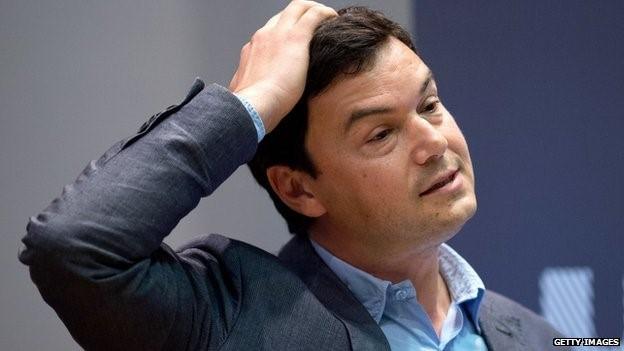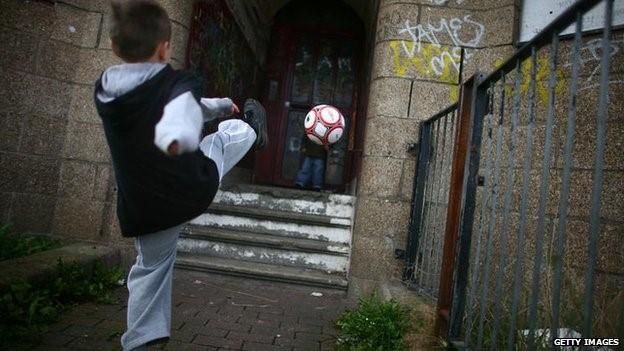Can more jobs eliminate child poverty?
- Published
- comments

French economist Thomas Piketty
Thanks to a French economist called Piketty, the question of whether the gap between rich and poor is irreversibly widening has become hotly debated (in case you haven't been paying attention, he has made a lifetime career of making the best of fairly lousy data, to demonstrate that reductions of inequality appear to be the exceptions to the rule).
But perhaps less important than the theory is what is happening and is likely to happen to the most vulnerable in our society, especially children.
And here a government-sponsored report by the National Institute for Economic and Social Research and Landman Economics, published by the Social Mobility and Child Poverty Commission, delivers a gloomy prognosis., external
It looked at whether increases in parental employment and wages alone would enable the government to hit its targets for reducing child poverty.
The answer is a resounding no. But perhaps more disturbing is what the report shows about quite how challenging it will be to hit these targets, even deploying the full panoply of government money and possible employment reforms.
Targets
To remind you (so sorry if this is otiose), there are two targets:
1) by 2020/2021, there should be fewer than 10% of children living in households where net income is less than 60% of median or typical household income;
2) by the same date, there should be fewer than 5% of children living in households with net income that is less than 60% of typical net income as it was in 2010/11, as uprated by the RPI rate of inflation.
The first is a target to cut relative child poverty, the second to cut absolute levels of child poverty.
So what happens to child poverty if earnings rise in line with the latest forecast by the government's Office for Budget Responsibility?
Well the NIESR and Landman say that 21% of families with children would be living in poverty on the relative measure - 11 percentage points above target and 3.5 percentage points higher than the proportion living in poverty in 2010/11.
As for absolute child poverty in 2020, that is forecast at 24%, a daunting 19 percentage points above target.
Of course the OBR forecasts may be wrong. In fact they almost certainly will be.
Resonant measure
But there is no realistic scenario for earnings or employment growth that would allow the targets to be hit: even where employment rises above the OBR forecast level and parents represent most of new entrants to work, the target for relative poverty is a long way from being met.
As for the absolute poverty target, the long and pernicious impact of the Great Recession of 2008 - which has seen earnings rise much more slowly than inflation - means that no plausible recovery in the jobs market would allow the target to be met.
On what the authors describe as the most optimistic scenario for wage and employment growth, absolute poverty is still forecast to be a full 16 percentage points above target by 2020.
There is apparently not even an extreme scenario for jobs creation, longer working hours and wages growth that sees the target being met.

Which is one resonant measure of the harm wreaked by the financial crisis of 2007-8, which precipitated the hideous earnings slump.
Now of course the conclusion is not that there is nothing that can be done to lift children out of poverty. Rather, it is that a more buoyant jobs market on its own would not be remotely sufficient to do what is required.
But of course it would be a very good thing if more parents earned a good deal more from employment, not least because that would generate greater tax revenues for the government and lower social-security support.
And if these tax proceeds and lesser outgoings for the Exchequer were then recycled into greater in-work benefits for low paid families, that would magnify the poverty-reducing impact of working more.
Or to put it another way, if anyone thought that defeating child poverty could be achieved simply by creating the conditions - including perhaps a stronger obligation - for poor parents to work more, that would appear to be naive and misguided (according to the report).
Lifting up the poorest and most vulnerable appears to require the state playing a substantial role in augmenting earnings from employment - and doing more than is currently written into government spending plans.